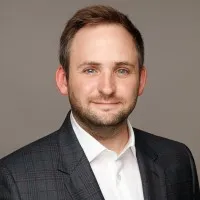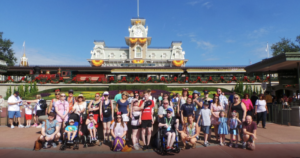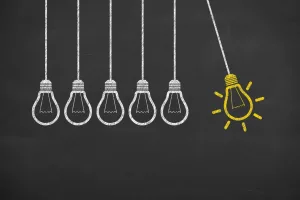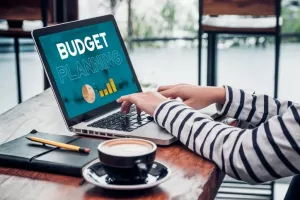17 May 2021|Latest Posts, Meet the Successful Founder

Nick Pinks is the CEO and co-founder of Covatic, a London- and Birmingham-based start-up exploring the use of mobile algorithms to bring smart personalisation to apps. Covatic’s technology allows media companies to deliver personalised in-app experiences by identifying when, where and how each individual can engage with content – all without exposing personal data.
Can you tell us a little about your background and the company?
I joined the BBC as a graduate trainee and ended up as a technology transfer manager and R&D engineer. I helped design the broadcast operations for our Glastonbury coverage and Radio 1’s Big Weekend, designed the physical hardware that carried all the video links for the Scottish Referendum – a lot of absolutely awesome things, when I look back on it.
What we do now at Covatic is based around proprietary software, integrated into a host app, such as a broadcaster’s app, that builds a unique engagement profile for every individual user by learning and predicting their activities, behaviours and preferences. But it owes a lot to what I learned then.
How did the idea for the company come to you?
While I was at the BBC, I knew I wanted to run my own business, and I was also developing a theory that broadcast as a concept could only succeed in the future if it found a way to address the individual better. The idea of ‘I speak and I command you to listen’ worked when there were four TV channels, but it doesn’t work in today’s world, when you consider what Facebook, Google and Apple know about their users and the degree of content personalisation that allows.
But the thing those companies don’t understand is the physical context – not just what you look up online, but do you take kids to school, do you go to school or university yourself, do you commute to work? The secret to finding out that sort of information is through an individual’s phone, which has a pretty good idea of when you wake up and when you go to sleep, and everything in between – your commute, your media consumption, your calendar.
So we set out to find a safe and non-invasive way to use those windows of opportunity to allow brands to speak to their consumers at the right time. And because all the data we use stays on people’s devices, these are insights that are also private and completely anonymous.
How did you achieve awareness?
Covatic really started in February 2017, and very early on we built a prototype for the BBC that proved to us we had a great product, and one the industry really needed. But then we had to build it, and that’s hard. So we spent two-and-a-half years building the team, the product, the algorithms.
Since then, we have built some really big strategic relationships with Comcast, the BBC, Liberty Global and Bauer. Now we are off the development and research track and onto the sales and support track. We are launching our self-service product this quarter and our aim is to get people to self-serve and have access to our tools in whatever sector the app is serving,
What are the key successes?
There are a few of these. Right at the beginning, getting the BBC. Our proof of concept that we built for them got taken to the House of Lords as part of a representation on the future of iPlayer, which was awesome. Then we won another deal with Discovery Networks and we were able to create the world’s first truly personalised highlights packages.
Just before the pandemic, we rolled out with Bauer in all of their radio apps. That was fascinating, because we saw an overnight change in when people were consuming content. And then, in autumn of 2020, when Comcast selected us to join their Techstars programme, choosing us against a lot of competition to be one of the stalwarts of their future approach – to be part of that journey is really exciting.
What were/are the challenges and how have you overcome these?
Funding is always challenging. Clients, especially big ones, always take longer to make a decision than you think they will, and you can’t go to a bank with a verbal yes. I have had hundreds and hundreds of nos from investors, for one reason or another. And that’s absolutely fine, and you have to be prepared for that.
And then the technical challenge – your heart always stops when Apple or Google make an announcement. Fortunately, we are absolutely aligned with all the things they are doing, for instance around privacy and the shift towards on-device data capture.
What are your plans now and for the future?
We are really doing well in media and we are going to continue to grow. I see us investing in our team more and more. We are at 12 people now, plus two part-time, and I see the company getting to 18 to 20 by the end of the year. We are also looking a lot around sustainability and we are working towards becoming a B Corps company.
What would you like to share with others to encourage them to start their own entrepreneurship journey?
It’s a fantastic journey, and it is something that anyone can do. I mean, I’m not an entrepreneur, I’m an engineer. It is difficult because it is unrelenting. It is your baby. I don’t have kids, but I imagine it is a bit like this. You have to give it your all, and you have to be prepared to be challenged in everything you think you know.
Can you share your tips for entrepreneurial success?
Get some great mentors and advisors. And also remember that investors and mentors are not necessarily the same – investors need their return, but mentors are the ones who are along with you for the journey. (Not to say that there aren’t also awesome investors – but be clear about what you are looking for from the people who are helping.)
And build your own KPIs. They are the tools for you to work out whether you have had a good month or a bad month. Because it is emotional, and there will be ups and downs, and you need hard data you can fall back on when you are down and you feel like giving up.
Who are the people who inspire you the most, and why?
Dame Ellen MacArthur. Just for her grit and determination. I nearly ran into her boat once in Cowes. I was in a dinghy with some friends. There was a bit of shouting. But I’m a big fan of hers. Twitter: https://twitter.com/ellenmacarthur
When I was at school my hero was always Sir Richard Branson, for his ridiculous risk-taking and rule-breaking. That’s not how I do business, but I like the rawness of the stories that surround him. Twitter: https://twitter.com/richardbranson
I’d also mention Sir Clive Woodward, for his insistence on getting everybody in his team to be across everything, so you can all work as one, which is something we try to do. Twitter: https://twitter.com/clivewoodward.
And [Baroness] Shami Chakrabarti, who became chancellor at my university when I was a student and told some illuminating stories from her time as a ministerial aide about how to steer and manage very senior people, as well as giving some very good advice about ethics.
What are your social handles and website links so our readers can connect with you?
Website: https://covatic.com
LinkedIn: https://www.linkedin.com/in/nicholas-pinks
- lisafoundersitehttps://thesuccessfulfounder.com/author/lisafoundersite/
- lisafoundersitehttps://thesuccessfulfounder.com/author/lisafoundersite/
- lisafoundersitehttps://thesuccessfulfounder.com/author/lisafoundersite/
- lisafoundersitehttps://thesuccessfulfounder.com/author/lisafoundersite/






